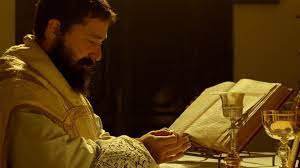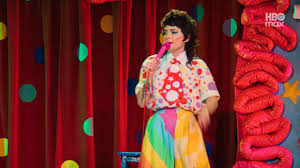Padre Pio 2023 Movie Review
First thing’s first, Abel Ferrara’s latest film “Padre Pio” can’t exactly be described as a biographical drama about Francesco Forgione, the Franciscan Capuchin friar whose stigmata and mystical abilities — as well as his ties to, and later rejection of, fascism — garnered him controversy during his lifetime. While Shia LaBeouf stars as Pio and the film sometimes features him, Ferrara isn’t much interested in the particulars of his life in any conventional sense. In fact, he spends much of the film’s running time among the exploited agricultural workers of rural southern Italy who embrace socialism as a means to combat their fascist oppressors. Meanwhile, Pio appears in disjointed vignettes contending with his guilt over various personal failings, like his evasion of military service and his numerous past sins.
The bifurcated structure and disregard for biopic conventions are welcome approaches, especially for a provocative stylist like Ferrara, but “Padre Pio” can’t generate interest in either narrative, both of which are marred by uneven performances and vague, slapdash writing. Ferrara can still create compelling images and pull together an impressive sequence, like the lengthy introduction of soldiers returning home to the town of San Giovanni Rotondo from World War I, which has a woozy, tragic immediacy. But the film’s clumsy melodramatic machinations stymies its efforts at creating an austere tone, rendering “Padre Pio” mostly an undeveloped mess.
It’s a shame because, theoretically, the workers’ uprising part of “Padre Pio” could have been compelling on its own merits. The debates over the merits of electioneering vs. collective agitation might be familiar but are no less relevant or interesting. Ferrara and co-writer Maurizio Braucci clearly intend for the fascist grumblings against leftist rhetoric and cries of a stolen election to have Trumpian resonance, but it’s certainly possible that the minimalist aesthetic could have given such a contemporary association some juice. Unfortunately, few of these dialogue-heavy scenes have any sort of rhythm to them, plodding along from point to point. The more observational scenes, like when the agricultural workers are transporting heavy rocks like a chain gang, fare better, but even those feel slightly monotonous, with Ferrara’s frenzied handheld camera doing too much heavy lifting.
Since “Padre Pio” features a lot of dead air, so to speak, it’s easy to focus on the occasionally distracting, frequently amusing idiosyncrasies. Ferrara’s choice to have the all-Italian cast speak in English sometimes gives their line readings a camp flair, like when revolutionary leader Luigi (Vincenzo Crea) starts mooing like a cow at a meeting to illustrate how nature is a cycle of constant change, or a landowner screaming, “All of you guys: this is my land!” while wildly shooting a gun on a horse in a thick Italian inflection. Similarly, Blind Willie Johnson’s gospel blues classic “Dark Was the Night, Cold Was the Ground,” one of 27 songs included on the Voyager Golden Record launched into space, scoring a laborer’s death from exhaustion has a certain eye-raising quality. It’s unclear if these moments are meant to be exaggerated to the point of abstraction or if there’s simply a disconnect between concept and execution.
The Pio scenes, on the other hand, are at the very least more interesting from an auteurist perspective, if only because they neatly fall into Ferrara’s thematic obsessions of Catholic guilt, the various threats of temptation and sin within a cloistered environment, and the fractured relationship between body and mind. Ferrara never quite makes the historical or biographical context for Pio’s personal torment explicit, which does give Pio’s struggle a haunting quality by implication. But too frequently, LaBeouf broods, cries, and counsels others in a vacuum, which ultimately makes them feel fairly empty.
In certain sequences, however, LaBeouf perversely compels as a man amidst a perma-spiritual crisis, struggling to find salvation by using his mystical powers to give back to the community. His sheer commitment to the role combined with Ferrara’s formal patience injects some emotional potency into a scene where Pio miraculously heals a disabled man on the street. Yet, there are just as many when LaBeouf merely resembles a walking collection of self-serious tics and one-note gestures. Pio cowering naked in the corner of a room screaming “Help me!”, a sequence which features a close-up of LaBeouf’s tear-stained face as saliva hangs from his mouth, should probably feel less ridiculous.
Many of the Pio scenes transparently court comparisons to LaBeouf’s real-life redemption attempts in the wake of serious abuse allegations made by his ex-girlfriends singer FKA Twigs and stylist Karolyn Pho. (Twigs filed a lawsuit against LaBeouf accusing him of sexual battery, assault, and emotional distress. The trial is set for April of next year.) How else to read a scene in which Pio desperately tries to silence a hallucinatory demon who browbeats him regarding “the fucking countless women you’ve fucking had your narcissistic way with”? While LaBeouf’s personal life certainly informs his performance, they don’t inherently lend these moments more gravity. They’re charged by our extratextual awareness of LaBeouf’s life but they’re rarely elevated by it.
With that said, arguably the film’s best, most absurd scene features Asia Argento, credited as “Tall Man,” who comes to Pio and confesses his incestuous urges toward his daughter. Pio condemns the man for his lack of contrition and blithe attitude toward the existence of God and Hell. Again, it’s possible to read this as LaBeouf flagellating the part of himself he considers secular or amoral, now that he has converted to Catholicism. Lines like “God is capable of pulling the highest good out of the worst tragedy” and “You don’t know if there’s Hell? You will when you get there” feel uncomfortably like LaBeouf confronting himself. But if that’s the case, its effect is greatly neutered by the deck-stacking fact that Pio remains the moral authority against a transparently immoral man. For better or worse, the scene’s queasy, porous ambiguity is quintessential Ferrara, culminating with LaBeouf hysterically screaming in a voice that most resembles the actor’s own, “Shut the fuck up! Say, ‘Christ is Lord’!”
It’s a pity the rest of “Padre Pio” lacks any of that scene’s flawed tension. Instead, we’re left with two disjointed tragic narratives that hardly reflect on each other and communicate little if anything, compounded by the presence of a controversial actor who seeks sympathy and admiration through a deprecatory performance or blatantly uses the role as a means of personal therapy. Either way, it’s a dull journey to a foregone conclusion.




